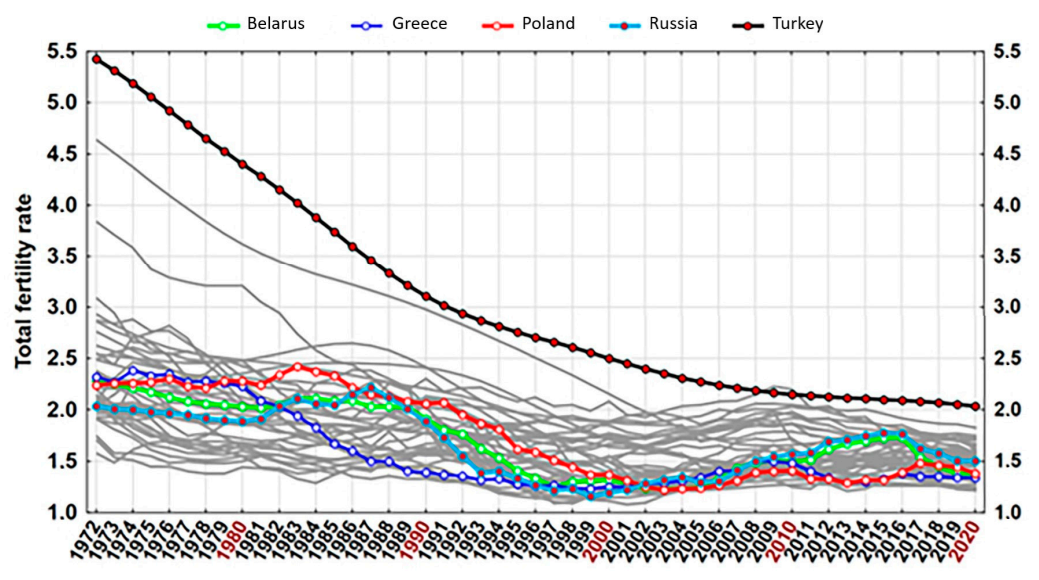
Introduction
Maternal health is a critical aspect of healthcare, influencing both the mother and child’s well-being. Understanding how different delivery types affect maternal health is essential. Furthermore, depression and life satisfaction are critical issues affecting women during pregnancy and postpartum. These experiences, varying significantly across different cultures, impact mental health and overall life satisfaction. A recent article, involving 2017 women from Poland, Greece, Turkey, Belarus, and Russia, examined the relationship between delivery type and maternal health, focusing on depression and life satisfaction.
The Global Fertility Landscape
Fertility rates have been declining globally, with South Korea experiencing a record low of 0.9 children per woman in 2021. The Organisation for Economic Co-operation and Development (OECD) reports an average fertility rate of 1.59, with Poland at 1.38. Generational replacement requires a fertility rate of about 2.1. Only a few countries, including Israel and South Africa, exceed this threshold. These demographic shifts influence societal structures and individual mental health, particularly for women navigating pregnancy and motherhood.

Emotional Challenges During Pregnancy
Pregnancy can be a time of heightened emotions, with many women experiencing anxiety and fear about childbirth. Research indicates that prenatal anxiety can manifest as physical complaints and difficulty concentrating. Depression, a common mood disorder, occurs twice as often in women as in men, peaking during reproductive years. In a Russian study, 36.4% of pregnant women reported prenatal depression, highlighting the significant emotional burden during this period.
Cultural Influences on Mental Health
Cultural factors significantly influence how depression is perceived and treated. Eastern populations, known for being family-centred, may experience maternity differently due to collective-oriented values. In Turkey, where 99% of the population is Islamic, cultural norms shape women’s experiences of pregnancy and mental health. Similarly, Greece and Poland, with strong religious influences, show varied life satisfaction levels among pregnant women. Understanding these cultural nuances is crucial for tailoring mental health support.
Depression and Life Satisfaction in Pregnant Women
Research assessed depression and life satisfaction among pregnant and postpartum women in five countries. The Beck Depression Inventory (BDI), Satisfaction with Life Scale (SWLS), the Edinburgh Postpartum Depression Scale (EPDS), the GHQ-28 (General Health Questionnaire), the Schwarzer Generalized Self-Efficacy Scale (GSES), and the KompOs Personal Competence Scale were used to assess these parameters, providing reliable insights into the mental health of the participants. The highest risk of depression was found in Turkey and Greece, while Poland reported the lowest. Interestingly, Turkish women reported the highest life satisfaction, contrasting with Greek women who had the lowest. These findings suggest that cultural and societal factors significantly impact mental health outcomes.
Factors Influencing Depression and Satisfaction
When considering how childbirth affects the mental health of mothers, the type and duration of delivery are important parameters. The findings revealed that the risk of depression and life satisfaction was not influenced by the type of delivery but by its duration. This highlights the importance of considering individual experiences during childbirth. Moreover, the presence of children did not significantly affect mental health, although Turkish women without children reported slightly higher life satisfaction.
Personal competence, particularly a sense of power, was negatively correlated with depression severity. This correlation was most pronounced in the Turkish community. The findings suggest that enhancing personal competence could be a strategy to mitigate depression risks, regardless of delivery type.
Implications for Healthcare
Healthcare providers must consider cultural contexts when addressing depression in pregnant women. Screening for depression should occur at least three times during pregnancy, as early detection can prevent major depressive episodes. Educational initiatives involving partners, families, and healthcare professionals can enhance understanding and support for women during this vulnerable period.
Conclusion
Pregnancy and childbirth, particularly for first-time mothers, often trigger intense emotions such as fear, stress, and anxiety, which can manifest as prenatal stress or anxiety disorders, affecting their ability to concentrate and manage daily activities. While delivery type does not significantly affect depression or life satisfaction, personal competence plays a crucial role. Depression and life satisfaction vary significantly among pregnant women across different cultures. While Turkey and Greece show higher depression risks, Polish women report lower rates. These differences highlight the need for culturally sensitive approaches to mental health care. By understanding these nuances, healthcare providers can better support women’s mental health during pregnancy and postpartum.
